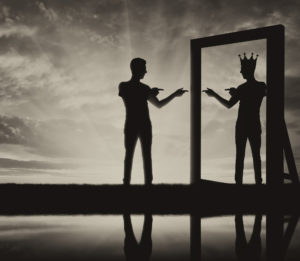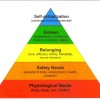
Individualism has been on the ascent across the world over the past few decades. Individualism per se is not necessarily bad. Individualism treats each individual as an independent entity and favours individual freedom over collective or state control. It encourages individuals to have a greater sense of self-responsibility and offers rewards more directly linked to their contributions. This empowering approach may well be responsible for some of the extraordinary achievements of individuals in the fields of business, science, technology and even sports.
However, I believe we have reached a stage where the balance between what’s good for the individual and what’s good for society may have tilted too much towards the individual. Fuelled by instant and disproportionate rewards for individual success in a capitalistic world, ‘I’, ‘Me’ and ‘Mine’ have taken centre-stage in our lives. The mantra of ‘winner takes all’ makes us self-centred. We instinctively perceive the world from a competitive lens rather than a collaborative one.
Books and media are a telling reflection of this cultural change. Scanning Google’s digitised database of over five million books, research has revealed that between 1960 and 2008, individualistic expressions like self, unique, all about me, I am special, and I’m the best have grown significantly. During that time, use of words like kindness, helpfulness, gratitude and modesty declined by over 70%.
Effects of excessive individualism
Individualism becomes excessive when instead of acknowledging that Everyone is special, we emphasise on I am special. The ugly side of this shift is now on display in all aspects of our society. Excessive individualism divides society into winner and losers. As a result, depression is on the rise, particularly among the young. It only gets worse by spending time on social media where narcissism is on the up and respect for others on the down. Personal relationships are quick to fracture and marriages break routinely. With the intent to enhance their self-esteem, we overprotect our children, affecting their resilience and preparation for long-term happiness.
Excessive individualism has infected our organisational culture and even the geo-politics. Corporate scandals appear with great regularity reminding us of the lure of profits with disregard to the welfare of employees, customers or the society. A competitive mindset, coupled with self-centredness, has given birth to nationalistic policies, even through some of them maybe detrimental for the rest of the world.
This has long-term implications for our society and its future. Show me any deep social issue of our time and I will show you its roots in individualism. Climate change, income inequality, and refugee crisis are all exacerbated by, if not borne out of, the singular pursuit of individual success (as represented by an individual, organisation or the nation).
Way forward
It’s time we started a rebalancing process to heal these wounds. A healthy balance between the individual and the whole! Imagine if your brain suggested that it’s the most important organ in the body and your stomach fought for the honour, who would win? Brain cannot function without the nutrients supplied by the digestive system and the stomach is dysfunctional without a healthy nervous system.
Neither the whole (be it our family, society or the planet) is more important than the individual (a person, organisation, or nation), nor vice-versa. What we need is to appreciate and celebrate their interdependence. This requires us to bring back the vocabulary and attitudes of kindness, helpfulness, gratitude and modesty that we seem to have been losing over the last fifty years. This can help us alleviate not only our personal anxieties, but also our collective strife.











 What Makes A Good Life?
What Makes A Good Life? Five Keys To Managing Interpersonal Conflicts
Five Keys To Managing Interpersonal Conflicts Are You Delivering Results But Not Making Impact?
Are You Delivering Results But Not Making Impact? Maslow’s Hierarchy Revisited…the Eastern Way!
Maslow’s Hierarchy Revisited…the Eastern Way! Meditation III: Joy of Mindfulness
Meditation III: Joy of Mindfulness
I agree with you when you say that individualism is not all bad and that individual traits, skills, personalities must be celebrated.
However, I don’t agree that it is individualism that has created the competition in the world today or the divide between the haves and have-nots, the losers and winners.
Individualism, according to me, is a great concept that enables us to accept ourselves (and others) as unique human beings. It allows us to understand that we have the power to be what we want to be, achieve what we can and want, make our own choices and modify them (when we want to) without feeling the guilt associated with not doing the ‘right thing’.
Unfortunately, the ‘right thing’ has been defined by our culture and society at large where a LOT of emphases is given on material aspects – wealth, beauty, and maybe power too! Characteristics like helpfulness, compassion, and gratitude are no longer rewarded or acknowledged. So there is no motivation to enhance or demonstrate these qualities for those who have them.
so, in the end I would opine that individualism is fine but we need to take a strong look at what the society as a whole is rewarding!
PS: Apologies for such a long comment – it truly is a topic close to my heart!
Hi Shiwani, thank you for your comment, you make a great point! I agree that individualism appropriately celebrates the individual’s uniqueness and chosen way of being. However, it conflicts with collective well-being when an individual who’s worked hard to be successful fails to be grateful for all the other people who may have helped him along the way; when the same individual becomes numb to the reality that many others in the world did not have the same opportunities as her and are in no way less than her; or become oblivious of how his need for personal growth might be impacting the growth and well-being of others in the family…that’s where it gets excessive and harmful…
Hi Rajiv, very insightful article, and has helped improve my understanding of moving in the direction of collaboration. Looking forward to the next one. Regards. Sima Kapur. Mumbai
Hi Rajiv, it’s a very insightful article. I also feel that while we are building our self esteem, it’s also important for us as individuals to look at our flaws . Most of the times, individuals feel they are great and unique and the world outside of them is ugly and therefore the separateness. Whereas individuals know that they are also flawed just like everyone else in the world, there might be a chance for words like compassion and kindness and empathy to come back into our vocabulary.
Thanks Hema!
Very nice Rajiv !
Hi Rajiv I do agree that individualism is on the rise. This does contribute especially in the young to issues that you have mentioned in your article. However what i notice is that most people are pursuing ‘happiness’ and that in itself is an individualistic concept – since what makes me happy may not necessarily work for you – this is what conventional wisdom says currently. Question is how do we reconcile this concept to a collaborative society? Does my pursuit of happiness for example lead to a collective happiness? Economic, social as well as philosophical reasons often dictate this ‘happiness’ and geographically and culturally also there are many differences. Am sure that modern sociologists would need to answer the question – how does one reconcile success and vigor which often emanates from individualism – to the fact that a collaborative society is a desired outcome? I think would be an interesting and informative debate for sure…..
Hi Sanjay, great point, thanks for sharing. I think the issue with pursuit of individual happiness can be misleading. If individuals are pursuing true happiness (not merely pleasure or pride or following a ‘don’t care’ attitude) by working on their inner self, they are bound to discover quickly that they can never be happy in isolation; that their happiness is intertwined with the happiness of others (starting with family members, friends and then their social ecosystem). Also, a key component of individual happiness is a sense of meaning, which can be truly experienced only when we go beyond our individual self; when we are selfless. That’s why unconditional love for our children is deeply rewarding. Lastly, when we are deeply happy and fulfilled within, we naturally want to give to others – not because we need to, but because its an overflow of our gratitude for life.
Happiness is state of mind.
If i am in happy state of mind, i may like to share this happiness with others
This happiness may be result of others kindness and gratitude to me or vice verse
Individualism perse is not to be viewed with disdain , it is our attitude towards society which matters
Happy individual& happy society should be the ultimate goal
Dear Rajiv, Always feel wonderful reading your articles. I am sure a lot of thought goes into each one of them. I fully agree that the attitude of GRATITUDE is something completely missing in daily life. Just think of how many people have to do their job on time every time for each one of us to have say breakfast? It would be over 100 people! Most of the time such simple things are taken for granted and we don’t even realise the amount of interdependence. With every change in generation, we are moving forward in terms of “comforts” but backward in terms of societal responsibility without realizing that we have to live in the society and not in isolation.
Absolutely Sai, thanks for sharing your comments!
Dear Rajiv
Very nicely articulated on individualism and contra i presume is collectivism.
Individulism is it not developed in an individual over a period of time based on his or her upbringing or experience. I am not sure if individulism breeds selfish competition as people with collectivism could also get into selfish competition.
There is a goodness factor in every person coupled with a trait of being open and reflective. My assumption is that when the goodnesses factor of an individual is low, empathy is limited and trait of open and reflective is low be the person with an individualistic or collectivism his or her focus on whats good for me gets triggered and thats when we see selfish competition.
I am not sure if above hypothesis could be also true as it could be an unconscious bias. Similarly what you have propounded that individualistic individuals create unhealthy behaviours could it trigger some bias in society is what I would like reflection on
Regards
Prince
Hi Prince, thanks a lot for sharing your insightful observations and comments. I agree that individualism by itself doesn’t automatically lead to being selfish. However, excessive individualism does. Like excessive collectivism can subdue individual growth, excessive individualism can disregard the collective welfare. Individualism suggests that everyone is special, but when we raise children by telling them that they are special (with an intent to raise their self-esteem), they can grow up with a higher sense of entitlement – that they are special and the world owes it to them. That’s where the excess becomes unhealthy. Similarly, excessive focus on fulfilling personal potential can result in not paying attention to others’ needs, pursuit of individual success as a leader or an organisation’s business without concern for social welfare can lead to accelerating climate change, maximising worthiness of the successful (compensation guided only by free market dynamics) leads to disproportionate income inequality. Talk soon!
New Money has created a new breed of individuals who come from mixed backgrounds. Relationships are more artificial, Fake too with selfish objectives basically simple transactions with no bonding.Egos are at peak and one can see more dysfunctional identities across as we are presenting ourselves in a competitive world.
Hi Rajiv
This is an insightful article. I like the way you have articulated the danger of straying from individualism to becoming self-centered. The former can lead to consciousness and commitment and, in turn, to better outcomes. The latter tends to turn sour and dysfunctional. Where to draw the line seems to be the issue.
So too with the idea of a person being whole and complete when integrated with a society that comes through in the comments and responses above. It reminds me of the poem by John Donne, “No man is an island”
Regards
Alagu
Thanks for your keen observations Alagu, appreciate it! I feel it takes a lot of self-awareness and inner discipline to not stray from the pure state of individualism to becoming self-centred. Like your reference to John Donne’s poem. Thanks!